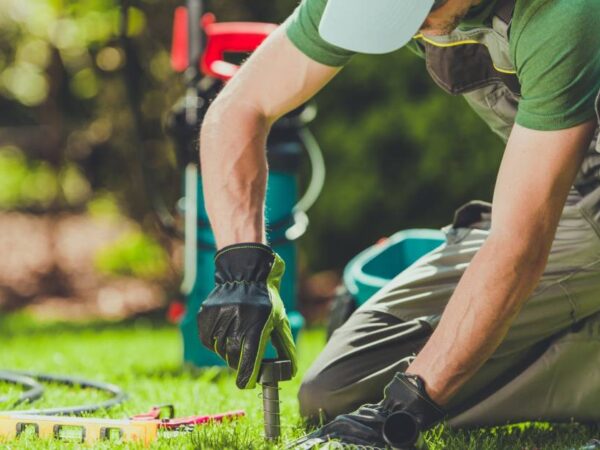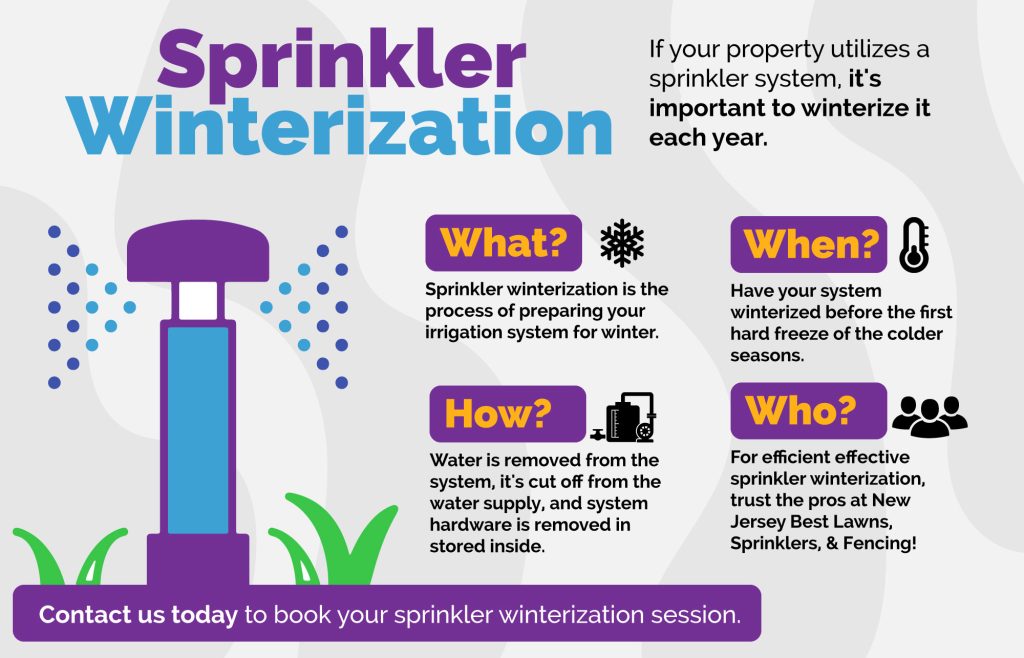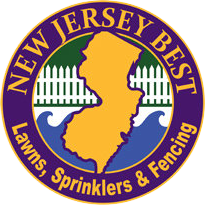
A Guide To Sprinkler Winterization
: 5 Minutes to Read
Welcome back to the New Jersey Best Lawns, Sprinklers, & Fencing blog! We’re happy to have you, and we’re even more excited to share some insightful property maintenance tips for our readers in the area.
In New Jersey, when it gets cold, it gets really cold! Not to mention, it seems like the first freeze of the season always comes unexpectedly, and much sooner than anticipated. And while the first freeze always arrives faster than we’d like it too, that doesn’t mean we can have our property prepared and protected against the risks winter can pose.
In particular, sprinkler winterization is a must for any property owner with a sprinkler system in New Jersey. In today’s blog, we’ll be covering all aspects of sprinkler winterization — the what, how, why, when, and yes, even who!
Keep reading to learn more.
What Is Sprinkler Winterization?
The obvious definition of sprinkler winterization is that it’s the process of preparing your property’s irrigation system for below-freezing temperatures. However, that doesn’t answer the full picture! At the end of the day, sprinkler winterization serves to prevent any damages to your irrigation system that would be caused by water freezing inside the system.
Furthermore, while many property owners don’t currently include sprinkler winterization in their yearly routine, it’s a simple and essential part of property maintenance and management. By taking the time and spending the resources to prep your sprinkler system, you can save so much time and money in the future.
How Is A Sprinkler System Winterized?
To prepare your sprinkler system for winter, you need to ensure that all of the water is removed from the system, that the system is disconnected from its water supply, and in some cases, that certain components of the system are removed and stored away for winter.
Depending on your system, the process of winterization will look a bit different, which makes consulting a professional the best course of action! What’s more, water can pool in any and all parts of your system, which means that any and every part of your irrigation system is susceptible to breaking if water freezes.
Most commonly, winterization includes the following steps:
- Turn Off Sprinkler Water Supply
- Drain The System (Manually Or Automatically Depending On System)
- Air Compressor “Blow Out” To Remove Remaining Water
*Unless you are experienced, do not try to execute the “blow out” method on your own, as too much air pressure can seriously damage your system.
Why Should I Winterize My System?
While we’ve touched on the main reasons why you need to winterize your sprinkler system in New Jersey, it never hurts to emphasize them. In the most basic sense, sprinkler winterization ensures that your irrigation system is constantly in efficient, working order. In the most intense scenarios, sprinkler winterization prevents catastrophic events with your sprinkler and even water system.
As we’ve already said, when water freezes, it expands. So if any aspect of your sprinkler system is full of water, that water will expand as it freezes and bust whatever component it’s resting in. While sometimes this may only cause a few places of localized, repairable damage, the more common scenario is that non-winterized sprinkler systems need to be replaced or majorly repaired, which results in extremely expensive and necessary bills.

When Should I Winterize My Sprinkler System?
While winter is in the service’s name, sprinkler winterization actually most often will happen in the fall. This is because it’s imperative that your system gets winterized prior to the first freeze of the colder months. And in our area, that can happen as early as September some years.
There are two main ways that you can go about your sprinkler winterization schedule. First, you can choose a day at the end of the summer to definitively finish watering your property and have your sprinkler system winterized before any threat of below-freezing weather. However, with this method, you run the risk of underwatering your lawn after winterizing your system.
The other method is to keep vigilant tabs on the weather! Check monthly forecasts, and take note of declining temperatures. When you see freezing temperatures on the horizon, schedule your winterization. With this method, note that you give enough time to schedule the winterization and have it performed. (You don’t want to schedule winterization the day before a projected freeze in case your service provider is booked up).
Who Should Winterize My Sprinkler System?
If you have an intimate understanding of your irrigation system and the methods and equipment needed to execute the process, you may be able to winterize your system on your own. However, your best course of action is to hire the trusted professionals at New Jersey Best Lawns, Sprinklers, & Fencing.
The truth is, we have the experience, expertise, and industry-leading equipment to ensure that your sprinkler winterization is completed thoroughly, efficiently, and in a timely manner.
If you have any questions about the sprinkler winterization process or would like to schedule our services, contact us today!
